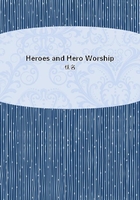
第74章
Poor Rousseau's face is to me expressive of him. A high but narrow contracted intensity in it: bony brows; deep, strait-set eyes, in which there is something bewildered-looking,--bewildered, peering with lynx-eagerness. A face full of misery, even ignoble misery, and also of the antagonism against that; something mean, plebeian there, redeemed only by _intensity_: the face of what is called a Fanatic,--a sadly _contracted_ Hero! We name him here because, with all his drawbacks, and they are many, he has the first and chief characteristic of a Hero: he is heartily _in earnest_. In earnest, if ever man was; as none of these French Philosophers were. Nay, one would say, of an earnestness too great for his otherwise sensitive, rather feeble nature; and which indeed in the end drove him into the strangest incoherences, almost delirations. There had come, at last, to be a kind of madness in him: his Ideas _possessed_him like demons; hurried him so about, drove him over steep places!--The fault and misery of Rousseau was what we easily name by a single word, _Egoism_; which is indeed the source and summary of all faults and miseries whatsoever. He had not perfected himself into victory over mere Desire; a mean Hunger, in many sorts, was still the motive principle of him. I am afraid he was a very vain man; hungry for the praises of men. You remember Genlis's experience of him. She took Jean Jacques to the Theatre; he bargaining for a strict incognito,--"He would not be seen there for the world!" The curtain did happen nevertheless to be drawn aside: the Pit recognized Jean Jacques, but took no great notice of him! He expressed the bitterest indignation; gloomed all evening, spake no other than surly words. The glib Countess remained entirely convinced that his anger was not at being seen, but at not being applauded when seen. How the whole nature of the man is poisoned; nothing but suspicion, self-isolation, fierce moody ways! He could not live with anybody. A man of some rank from the country, who visited him often, and used to sit with him, expressing all reverence and affection for him, comes one day; finds Jean Jacques full of the sourest unintelligible humor. "Monsieur," said Jean Jacques, with flaming eyes, "I know why you come here. You come to see what a poor life I lead; how little is in my poor pot that is boiling there. Well, look into the pot! There is half a pound of meat, one carrot and three onions; that is all: go and tell the whole world that, if you like, Monsieur!"--A man of this sort was far gone. The whole world got itself supplied with anecdotes, for light laughter, for a certain theatrical interest, from these perversions and contortions of poor Jean Jacques. Alas, to him they were not laughing or theatrical; too real to him! The contortions of a dying gladiator: the crowded amphitheatre looks on with entertainment; but the gladiator is in agonies and dying.
And yet this Rousseau, as we say, with his passionate appeals to Mothers, with his _contrat-social_, with his celebrations of Nature, even of savage life in Nature, did once more touch upon Reality, struggle towards Reality;was doing the function of a Prophet to his Time. As he could, and as the Time could! Strangely through all that defacement, degradation and almost madness, there is in the inmost heart of poor Rousseau a spark of real heavenly fire. Once more, out of the element of that withered mocking Philosophism, Scepticism and Persiflage, there has arisen in this man the ineradicable feeling and knowledge that this Life of ours is true: not a Scepticism, Theorem, or Persiflage, but a Fact, an awful Reality. Nature had made that revelation to him; had ordered him to speak it out. He got it spoken out; if not well and clearly, then ill and dimly,--as clearly as he could. Nay what are all errors and perversities of his, even those stealings of ribbons, aimless confused miseries and vagabondisms, if we will interpret them kindly, but the blinkard dazzlement and staggerings to and fro of a man sent on an errand he is too weak for, by a path he cannot yet find? Men are led by strange ways. One should have tolerance for a man, hope of him; leave him to try yet what he will do. While life lasts, hope lasts for every man.
Of Rousseau's literary talents, greatly celebrated still among his countrymen, I do not say much. His Books, like himself, are what I call unhealthy; not the good sort of Books. There is a sensuality in Rousseau.
Combined with such an intellectual gift as his, it makes pictures of a certain gorgeous attractiveness: but they are not genuinely poetical. Not white sunlight: something _operatic_; a kind of rose-pink, artificial bedizenment. It is frequent, or rather it is universal, among the French since his time. Madame de Stael has something of it; St. Pierre; and down onwards to the present astonishing convulsionary "Literature of Desperation," it is everywhere abundant. That same _rose-pink_ is not the right hue. Look at a Shakspeare, at a Goethe, even at a Walter Scott! He who has once seen into this, has seen the difference of the True from the Sham-True, and will discriminate them ever afterwards.
We had to observe in Johnson how much good a Prophet, under all disadvantages and disorganizations, can accomplish for the world. In Rousseau we are called to look rather at the fearful amount of evil which, under such disorganization, may accompany the good. Historically it is a most pregnant spectacle, that of Rousseau. Banished into Paris garrets, in the gloomy company of his own Thoughts and Necessities there; driven from post to pillar; fretted, exasperated till the heart of him went mad, he had grown to feel deeply that the world was not his friend nor the world's law.